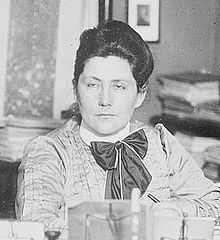Lydia Rabinowitsch-Kempner: Difference between revisions
m Dated {{Citation needed}}. (Build p604) |
No edit summary |
||
| Line 6: | Line 6: | ||
Lydia Rabinowitsch was born at Kovno, [[Russian Empire]] (now [[Kaunas]], [[Lithuania]]). She was educated at the girls' [[Gymnasium (school)|gymnasium]] of her native city, and privately in [[Latin language|Latin]] and [[Greek language|Greek]], subsequently studying [[natural science]]s at the universities of [[University of Zurich|Zurich]] and [[University of Bern|Bern]] ([[Doctor of Medicine|MD]]). After graduation she went to [[Berlin]], where Professor Koch permitted her to pursue her [[bacteriology|bacteriological]] studies at the Institute for Infectious Diseases. |
Lydia Rabinowitsch was born at Kovno, [[Russian Empire]] (now [[Kaunas]], [[Lithuania]]). She was educated at the girls' [[Gymnasium (school)|gymnasium]] of her native city, and privately in [[Latin language|Latin]] and [[Greek language|Greek]], subsequently studying [[natural science]]s at the universities of [[University of Zurich|Zurich]] and [[University of Bern|Bern]] ([[Doctor of Medicine|MD]]). After graduation she went to [[Berlin]], where Professor Koch permitted her to pursue her [[bacteriology|bacteriological]] studies at the Institute for Infectious Diseases. |
||
In 1895 she went to [[Philadelphia]], where she was appointed lecturer and, subsequently, professor at the |
In 1895 she went to [[Philadelphia]], where she was appointed lecturer and, subsequently, professor at the [[Woman's_Medical_College_of_Pennsylvania]]. There she founded a bacteriological institute, though still continuing her studies every summer under Professor Koch. |
||
In 1896 she delivered before the [[International Congress of Women]] at Berlin a lecture on the study of medicine by women in various countries. At the congress of scientists held at [[Breslau]] in 1904 she presided over the section for [[hygiene]] and [[bacteriology]]. |
In 1896 she delivered before the [[International Congress of Women]] at Berlin a lecture on the study of medicine by women in various countries. At the congress of scientists held at [[Breslau]] in 1904 she presided over the section for [[hygiene]] and [[bacteriology]]. |
||
Revision as of 17:39, 21 January 2011

Lydia Rabinowitsch-Kempner (August 22, 1871 – August 3, 1935) was an American[citation needed] physician.
Lydia Rabinowitsch was born at Kovno, Russian Empire (now Kaunas, Lithuania). She was educated at the girls' gymnasium of her native city, and privately in Latin and Greek, subsequently studying natural sciences at the universities of Zurich and Bern (MD). After graduation she went to Berlin, where Professor Koch permitted her to pursue her bacteriological studies at the Institute for Infectious Diseases. In 1895 she went to Philadelphia, where she was appointed lecturer and, subsequently, professor at the Woman's_Medical_College_of_Pennsylvania. There she founded a bacteriological institute, though still continuing her studies every summer under Professor Koch.
In 1896 she delivered before the International Congress of Women at Berlin a lecture on the study of medicine by women in various countries. At the congress of scientists held at Breslau in 1904 she presided over the section for hygiene and bacteriology.
Marriage
In 1898 she married Dr. Walter Kempner of Berlin.
Death
She died in 1935, aged 63, from undisclosed causes.
Bibliography
- Anna Plothow. Der Weltspiegel, October 27, 1904
- Deutsche Hausfrauenzeitung, July 1897, by Isidore Singer & Regina Neisser
References
 This article incorporates text from a publication now in the public domain: Singer, Isidore; et al., eds. (1901–1906). The Jewish Encyclopedia. New York: Funk & Wagnalls.
This article incorporates text from a publication now in the public domain: Singer, Isidore; et al., eds. (1901–1906). The Jewish Encyclopedia. New York: Funk & Wagnalls. {{cite encyclopedia}}: Missing or empty|title=(help) [1]
- Orphaned articles from June 2010
- 1871 births
- 1935 deaths
- American biologists
- American Jews
- American people of Lithuanian-Jewish descent
- American physicians
- American feminists
- Imperial Russian immigrants to the United States
- Jewish American scientists
- Jewish feminists
- Lithuanian Jews
- Naturalized citizens of the United States
- People from Kaunas
- Women biologists
- American medical biography stubs
